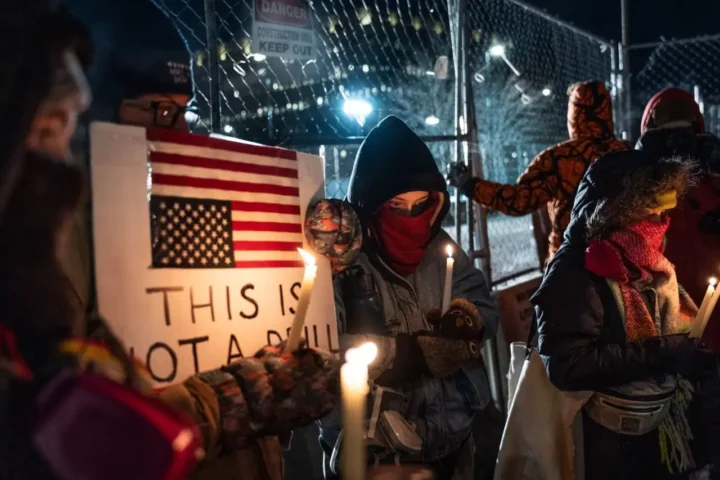U.S. President Donald Trump’s unprecedented White House meeting with Pakistan’s Army Chief Asim Munir, bypassing Pakistan’s elected government, has sparked global concern. Such high-level engagement with a military leader, not a civilian counterpart, undermines democratic norms, risks legitimizing military dominance in Pakistan, and sets a troubling precedent for international diplomacy. The meeting, which covered security, trade, and regional crises, signals a strategic US-Pakistan realignment, weakens civilian institutions in Pakistan. History warns that empowering militaries over elected leaders destabilizes democratic governance and encourages authoritarian tendencies in fragile states.
Earlier this week, an unusual and deeply troubling diplomatic theater unfolded in Washington. U.S. President Donald Trump hosted Pakistan’s Chief of Army Staff, General Asim Munir, at the White House. There was no sign of Pakistan’s civilian leadership. No Prime Minister. No Foreign Minister. Just a general – shaking hands, smiling for the cameras, and reportedly discussing everything from Middle East security to cryptocurrency policy.
For the casual observer, the meeting may have seemed like just another episode in the Trumpian spectacle of unconventional diplomacy. But for those who care about the global state of democracy, it should ring alarm bells. This was not just an informal chat. It was a public relations coup for Pakistan’s military establishment and a dangerous precedent for how the United States – and the world – engages with authoritarian actors cloaked in uniforms.
A General’s Reception – and a Civilian’s Erasure
The symbolism could not have been clearer: A U.S. president rolled out the red carpet for a general from a country where the military has a long and well-documented history of undermining democratic institutions. The absence of Pakistan’s civilian leaders wasn’t an oversight. It was a statement – one that says power doesn’t reside in parliament or in the hands of elected officials, but in the barracks of Rawalpindi.
To understand the gravity of this moment, one must grasp how deeply entrenched military power is in Pakistan. Over the decades, Pakistan’s army has evolved from being merely a national defense institution to a full-blown parallel state. It commands an estimated $20 billion economic empire, wields de facto control over foreign policy, and routinely meddles in domestic politics. It doesn’t just protect the state – it shapes it, owns it, and often controls who gets to run it.
Martial Control Without Martial Law
Pakistan’s generals have perfected a modern twist on authoritarianism: military rule without the messiness of a coup. Recent legislative changes – like the 2023 amendments to the Army Act and the Official Secrets Act – have codified military oversight into the country’s civilian infrastructure. The result? A sophisticated architecture of control that allows the army to govern from behind the curtain while maintaining the illusion of a democratic process.
This “soft” dictatorship is propped up through media manipulation, judicial complicity, and, perhaps most dangerously, international legitimation. When world leaders engage directly with generals while bypassing elected officials, they send an unmistakable message: we acknowledge who’s really in charge – and we’re okay with that.
The Theory – and the Risk – of Military Legitimacy
Political science and international relations theory offer chilling clarity on why this matters.
From a neorealist standpoint, empowering militaries in unstable democracies creates a paradox. While states build strong armies for external deterrence, that same strength can become a domestic threat. Economist Daron Acemoglu’s research on military dictatorships shows that when military institutions grow too autonomous, they often usurp power from civilian authorities. In legitimizing General Munir as Pakistan’s key interlocutor on issues ranging from counterterrorism to global trade, Trump inadvertently reinforced the army’s supremacy – and encouraged further encroachment into civilian domains.
From a liberal institutionalist view, democracies thrive on rule-based systems and elected accountability. Democracies also tend not to go to war with one another. But when foreign leaders bypass democratic norms by engaging with unelected generals, they weaken those institutions. A study by political scientist Jin Kyu Kim reveals that visible international support for civilian leaders—and not their military counterparts – reduces the risk of coups by nearly half. In other words, had a U.S. president insisted on meeting Pakistan’s prime minister instead of its top general, it might have nudged the country closer to genuine democracy. Instead, we moved the other way.
Even through the lens of constructivism, which views diplomacy as a forum for norm-building, the damage is stark. Trump’s meeting sent a powerful symbolic message: generals are the real decision-makers. That kind of norm, once normalized, spreads. It’s how coups in Egypt and Myanmar gain silent approval. It’s how civil-military imbalances calcify into permanent autocracies.
A Propaganda Victory for Authoritarians
Predictably, Pakistan’s military didn’t miss the opportunity to spin the meeting into a domestic narrative. State-controlled media heralded it as a sign of General Munir’s “statesmanship.” Pro-military pundits declared it proof that the West views Pakistan’s army as the only reliable institution left standing. The irony? They weren’t entirely wrong.
Even the optics of the meeting provided ammunition. Munir reportedly discussed everything from Iran-Israel tensions to artificial intelligence policy – topics well outside his constitutional purview. And yet there he was, taking selfies with an ex-U.S. president, extending an open invitation to Trump to visit Pakistan, and basking in the glow of a world power’s implicit endorsement.
Pakistan’s civilian government, already under the military’s thumb, was nowhere to be found.
This Isn’t Just About Pakistan
Why should this worry Americans, or anyone in a stable democracy? Because it’s part of a broader erosion of global democratic norms. When powerful nations treat military leaders as legitimate counterparts to presidents and prime ministers, it encourages others to do the same. The domino effect is real – and it’s happening in plain sight.
Think of Egypt, where U.S. support for General Abdel Fattah el-Sisi helped him consolidate power after deposing an elected president. Think of Myanmar, where international inaction following military takeovers emboldened generals to crush democratic protests with impunity.
We must stop pretending that diplomacy exists in a vacuum. Every handshake with a general sends a signal to that country’s citizens, to its civilian politicians, and to autocrats around the world. And that signal is clear: We will engage with you even if you overthrow democracy, so long as you wear a uniform and promise stability.
Democracy Can’t Be Outsourced to Soldiers
It’s time for the United States – and other democracies – to draw a hard line. Diplomacy should be led by diplomats. Trade should be negotiated by economic ministries. Security partnerships should complement, not replace, civilian oversight. If a country’s military insists on speaking for its nation, that’s not pragmatism – it’s a red flag.

The U.S. has tools it can use to reverse course. For one, it can condition military and economic aid on verifiable reforms, such as repealing laws that institutionalize army dominance. It can also refuse meetings with military leaders who arrive without their civilian counterparts. Symbolic as these gestures may seem, they send powerful messages – both to the countries involved and to others watching.
Moreover, trade negotiations and investment deals must go through elected officials, not military proxies. When American businesses strike deals with military-run conglomerates in countries like Pakistan or Myanmar, they don’t just risk corruption – they actively finance autocracy.
A Red Carpet to the Barracks
The images from Trump’s meeting with General Munir will fade. But their consequences may linger. They mark another step away from a rules-based global order, toward a world where men in fatigues replace those in suits as legitimate partners in diplomacy. That’s not just undemocratic – it’s dangerous.
Pakistan’s founding father, Muhammad Ali Jinnah, envisioned a country governed by law, not by the barrel of a gun. “You will find,” he once told Pakistan’s military officers, “that in course of time Hindus would cease to be Hindus and Muslims would cease to be Muslims, not in the religious sense… but in the political sense.” He dreamed of a state where identity and power were shaped by civic values – not enforced by men in uniform.
Today, that dream flickers faintly. But it is not dead. It rests on the courage of Pakistan’s people, the resilience of its civil society – and the choices of world leaders who decide whether to stand with citizens or salute their generals.
As Pakistani protesters declared during Munir’s visit to the U.S.: “Democracy dies when guns speak.” The question now is whether America, a beacon of democracy itself, is still listening.
References and Further Reading
- Reuters
Reuters covered the unprecedented nature of the meeting, noting that it was unusual for a U.S. president to host a Pakistani military leader at the White House without senior civilian officials present. The article also discusses the regional context, including recent India-Pakistan tensions and the historical dominance of Pakistan’s military in politics.
Citation:
Reuters. “Pakistan’s army chief to meet Trump after conflict with India defused.” June 18, 2025.
https://www.reuters.com/world/asia-pacific/pakistans-army-chief-meet-trump-after-conflict-with-india-defused-2025-06-18/ - NDTV
NDTV, citing U.S. and Indian officials, reported that Trump praised Munir for his role in de-escalating conflict with India and highlighted that the meeting was the first of its kind, with a U.S. president hosting Pakistan’s army chief without civilian leaders.
Citation:
NDTV. “Trump Hosts Pak’s Asim Munir For Lunch, Cites This Reason For Inviting Him.” June 19, 2025.
https://www.ndtv.com/world-news/us-president-donald-trump-hosts-pakistan-army-chief-asim-munir-for-lunch-india-iran-israel-attacks-8704673 - Al Jazeera
Al Jazeera analyzed the strategic implications of Trump’s meeting with Munir, noting the break with previous U.S. policy and the potential message it sends about Pakistan’s military dominance. The article includes expert commentary on the risks of legitimizing military rule through such high-level engagements.
Citation:
Al Jazeera. “Trump embraces Pakistan: ‘Tactical romance’ or a new ‘inner circle’?” June 19, 2025.
https://www.aljazeera.com/news/2025/6/19/trumps-pakistan-embrace-tactical-romance-or-a-new-inner-circle - Times of India
The Times of India reported that Trump, after meeting Munir, walked back on his claims of brokering an India-Pakistan ceasefire, emphasizing the unusual nature of the meeting and its implications for diplomatic norms.
Citation:
Times of India. “Honoured to meet Pak army chief Asim Munir, says Trump after their discussion.” June 20, 2025.
https://timesofindia.indiatimes.com/world/us/honoured-to-meet-pak-army-chief-asim-munir-says-trump-after-their-discussion/articleshow/121962781.cms - Reuters
Another Reuters article details India’s official position that the ceasefire with Pakistan was achieved through direct military-to-military talks, not U.S. mediation, and provides further context on the Trump-Munir meeting.
Citation:
Reuters. “India will not accept third-party mediation relations with Pakistan, Modi tells Trump.” June 18, 2025.
https://www.reuters.com/world/asia-pacific/india-will-not-accept-third-party-mediation-relations-with-pakistan-modi-tells-2025-06-18/ - Economic Times
The Economic Times highlighted protests against Munir’s visit and the historical rarity of such meetings, noting that the last time a Pakistani military leader met a U.S. president was during General Musharraf’s rule.
Citation:
Economic Times. ‘”I wanted to thank him for…”: Trump on meeting Pakistan Army Chief General Asim Munir.’ June 19, 2025.
https://economictimes.com/news/international/global-trends/i-wanted-to-thank-him-for-trump-on-meeting-pakistan-army-chief-general-asim-munir/articleshow/121942214.cms











